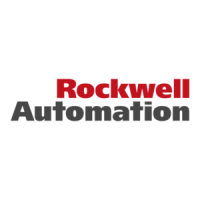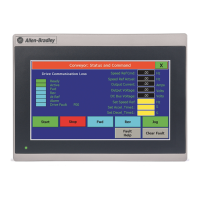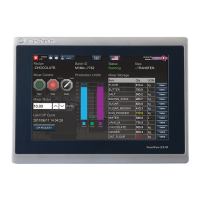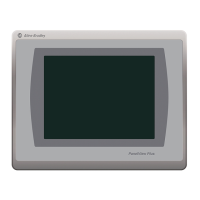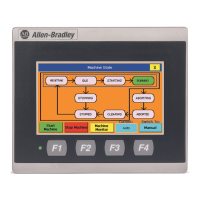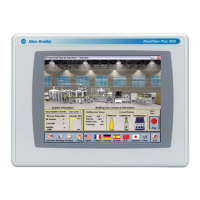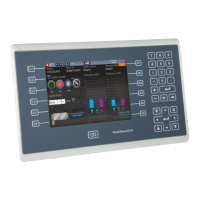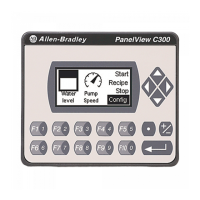Do you have a question about the Rockwell Automation PanelView Plus Series and is the answer not in the manual?
This preface provides information on these topics.
Use this manual if you are responsible for installing, operating, or troubleshooting the PanelView Plus or PanelView Plus CE terminals.
For additional information, refer to these publications, that you can download from http://literature.rockwellautomation.com.
To receive software updates (software serial number required) and firmware upgrades for your terminal:
This chapter gives an overview of the PanelView Plus terminals.
FactoryTalk View ME runtime software is included with all PanelView Plus and PanelView Plus CE terminals.
The PanelView Plus 400 and 600 terminals offer:
This section gives an overview of the PanelView Plus 700, 1000, 1250, 1250H, and 1500 terminals.
The table shows the catalog number configuration for configured versions of the PanelView Plus and PanelView Plus CE terminals.
Components are available as separate catalog numbers for field installation or replacement.
This chapter provides pre-installation information and procedures on how to install the terminals.
This equipment is suitable for these locations:
This equipment is intended for use in a Pollution Degree 2 industrial environment, in overvoltage Category II applications.
These tools are required for panel installation:
Use the full size template shipped with your terminal to mark the cutout dimensions.
Mounting levers secure the terminal to the panel. The number of levers you use (4 or 6) varies by terminal type.
Mounting clips secure the terminal to the panel. The number of clips you use (4, 6, or 8) varies by terminal type.
Product dimensions for each terminal are in mm (in.).
This chapter covers wiring and safety guidelines, and provides procedures to:
Use publication NFPA 70E Electrical Safety Requirements for Employee Workplaces, IEC 60364 Electrical Installations in Buildings, or other applicable wiring safety requirements.
The terminals are shipped with the power terminal block installed. You can remove the terminal block for ease of installation, wiring, and maintenance.
PanelView Plus terminals with an integrated, 24V DC power supply have these power ratings
PanelView Plus devices with an integrated AC power supply have these power ratings.
Use the reset switch to restart a terminal without having to disconnect and reapply power.
This chapter shows how to use the Configuration mode of your PanelView Plus terminal to:
Your PanelView Plus device has onboard software, FactoryTalk View ME Station, to perform and configure terminal operations.
You can load a FactoryTalk View ME .MER application from the internal CompactFlash in the terminal or an external CompactFlash card.
You can modify settings on the terminal that are not specific to the application.
You configure communication for your application and controller by using RSLinx Enterprise software.
You can configure network information for your terminal.
FactoryTalk View ME Station software starts based on shortcuts in the Windows startup folder and whether an application is loaded.
The terminal can run extended tests on startup. You can select which test to run and also specify test settings on startup.
This chapter applies only to PanelView Plus CE terminals and provides information on these topics:
The Windows CE .NET operating system from Microsoft provides a portable, scalable, real-time operating system for embedded devices.
The PanelView Plus CE terminal includes FactoryTalk View ME software.
The PanelView Plus CE has the following memory areas:
The PanelView Plus CE terminal has user-configurable settings that are accessed from the Windows CE .NET Control Panel applications.
This chapter shows how to install, replace, or upgrade various components of the PanelView Plus terminals.
These tools are required to install and replace components:
Before installing or replacing any components, disconnect power from the terminal.
The logic module of the 700 to 1500 terminals is available with or without RAM and internal CompactFlash installed.
This section shows how to install and replace a communication module.
This section shows how to replace the display module on 700 to 1500 terminals.
The 700 to 1500 terminals have a lithium battery that is intended to be replaced during the life of the product.
It is not necessary to remove the logic module or communication module before removing the bezel, except on the PanelView Plus 700 terminal.
This section shows how to replace the backlight for the 700, 1000, 1250, and 1500 terminals.
This section shows how to replace the legend inserts in the keypad terminals.
All of the terminals have a CompactFlash card slot that supports Type 1 CompactFlash cards.
This chapter provides network and device connections for the terminals.
Use publication NFPA 70E, Electrical Safety Requirements for Employee Workplaces, IEC 60364 Electrical Installations in Buildings or other applicable wiring safety requirements.
The charts provide a summary of terminal connections to controllers and network interface modules.
The PanelView Plus and PanelView Plus CE terminals contain integral and modular (externally attached) communication ports.
The 700 to 1500 terminals have two USB ports. The 400 and 600 terminals have one USB port.
The base-configured unit of all terminals has a multi-purpose serial RS-232 port that supports:
The base-configured unit of the 700 to 1500 terminals and the network based unit of the 400 and 600 terminals have an Ethernet port that supports:
Terminals with a DH-485/DH+/Remote I/O communication module support communication with these networks.
Use the Belden 9463 twin axial or equivalent cable (cat. no. 1770-CD), to connect a terminal to a DH+ link.
Terminals with a ControlNet communication module support communications and the transfer of applications between devices on a ControlNet network.
Terminals with a DeviceNet communication module support communication and the transfer of applications between devices on a DeviceNet network.
This chapter covers these topics:
You can transfer applications using a CompactFlash card or a computer.
This section shows how to create an ActiveSync connection between a computer and a PanelView Plus CE terminal.
The Firmware Upgrade Wizard (FUW) lets you upgrade firmware in a PanelView Plus terminal.
This section shows how to upgrade the firmware in the terminal using a CompactFlash card.
You can upgrade the firmware in a terminal that is connected to a desktop computer using a Serial, Ethernet, or Network with RSLinx Enterprise software connection.
The Operating System (OS) compressed binary image resides in a binary partition of the Internal (IDE) CompactFlash in the logic module for PanelView Plus CE terminals.
This chapter provides information on how to isolate and correct common operating problems with system components.
The terminals have two LED indicators to isolate operating problems.
This section provides general troubleshooting information to assist you when trying to isolate problems.
When an error occurs, the terminal displays the error number with a text message.
This section provides tips on how to isolate problems with individual components of the terminal, including the display, touch screen, keypad, attached keyboard or mouse.
This section provides tips on how to isolate Ethernet problems.
If the PanelView Plus application does not start, there may be a problem with the .MER FactoryTalk View ME file.
The error messages in this section appear on startup if incorrect or invalid components are used with the 700 to 1500 terminals.
On PanelView Plus CE terminals, use the default switch with the reset switch to start the terminal in Safe mode.
This chapter provides information on the following topics:
Use a protective antiglare overlay for easier cleaning of the display window.
This section contains disposal information for the backlight assembly and battery.
Attribute Value
Attribute Value
Attribute Value
Attribute Value
Attribute Value
Certifications (1) Value
Rockwell Automation Cat. No. 6189-KBDEPU1U Yes Yes
Logitec Optical Mouse - M-BJ58 Yes Yes
Belkin USB 4-Port Hub - ESU021 Yes Yes
The following fonts are pre-installed on PanelViewPlus CE terminals:
To use additional fonts on a PanelView Plus CE device, copy any of the font files on the PanelView Plus CE Accessories CD or the Machine Editions Fonts CD to the following directory:
The tables in this appendix shows the Windows virtual key code mapping of each programmable function key on the PanelView Plus CE terminal.
Security requires a comprehensive application of policies and technology, and an awareness of security needs and potential vulnerabilities.
| Display Type | Color TFT LCD |
|---|---|
| Communication Ports | Ethernet, USB, Serial (RS-232) |
| Power Supply | 24V DC |
| Operating System | Windows CE |
| Processor | Varies by model (e.g., ARM, x86) |
| Enclosure Rating | NEMA 4X, IP65 (front panel) |
| Operating Temperature | 0 to 50 °C (32 to 122 °F) |
